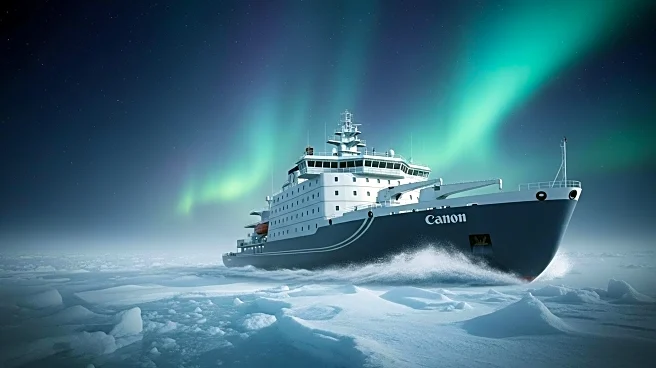What's Happening?
The United States has signed a $6.1 billion agreement with Finland to purchase up to four new icebreakers, aiming to strengthen its presence in the Arctic region. This move comes as the U.S. seeks to address concerns about falling behind Russia and China in Arctic influence and security. President Trump and Finnish President Alexander Stubb formalized the deal, which is part of a broader strategy to close the 'icebreaker gap' that has left the U.S. reliant on outdated vessels for Arctic patrols. The Finnish shipbuilders, known for their expertise in polar vessel design, will provide the icebreakers, enhancing the U.S. Coast Guard's capabilities in the region. The Arctic is increasingly seen as a critical area for homeland defense, with expanding Russian and Chinese military activities prompting the U.S. to bolster its early-warning systems and missile detection networks.
Why It's Important?
The acquisition of new icebreakers is crucial for the U.S. to maintain its sovereignty and interests in the Arctic, a region rich in hydrocarbons, minerals, and rare elements. As melting sea ice opens new shipping lanes, the strategic importance of the Arctic has grown, with Russia and China increasing their presence through military drills and infrastructure development. The U.S. aims to counter these moves and secure its position in the region, which is vital for national security and economic interests. The deal with Finland also strengthens NATO ties, as Finland recently joined the alliance, and supports collaborative efforts under the ICE Pact to enhance polar operations among allied nations.
What's Next?
The U.S. Coast Guard plans to integrate the new icebreakers into its fleet, which currently includes only two operational polar icebreakers. The service has expressed the need for at least eight polar icebreakers to meet its operational requirements. The new vessels will enable the Coast Guard to better monitor and respond to activities in the Arctic, including those by Chinese and Russian vessels. The U.S. will continue to work with Finland and other allies to fast-track icebreaker construction and share technology, ensuring a robust presence in polar waters.
Beyond the Headlines
The Arctic's geopolitical significance is underscored by its role in global trade routes and resource extraction. Russia's control over the Northern Sea Route and China's ambitions in the region highlight the strategic competition among major powers. The U.S. must navigate these dynamics carefully, balancing military preparedness with diplomatic engagement to prevent conflicts and ensure sustainable development in the Arctic.











